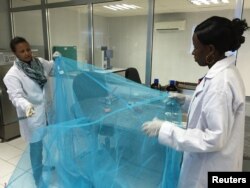In its latest annual report, the World Health Organization says strong progress has been made in the fight against malaria, particularly in offering effective control programs to children and pregnant women in Africa.
The organization, however, warns funding has plateaued, putting targets for tackling the disease at risk.
The WHO’s 2016 report highlights significant achievements in the global fight against malaria. Mortality rates for the annual number of deaths from malaria have been halved in the past 16 years to just over 400,000.
Programs to distribute insecticide-treated mosquito nets are the cornerstone of malaria prevention efforts in Africa, says Dr. Jo Lines of the London School of Hygiene and Tropical Medicine.
“The progress is that now 53 percent, just over half that target population and it's a very large target population in some very difficult to reach places. Fifty-three percent of those people now report sleeping under an insecticide-treated net,” said Lines said. “That's fantastic."
Mosquitoes becoming resistant
As more insecticide is used to prevent malaria, however, the mosquitoes that transmit the disease are becoming resistant.
"Insecticide resistance is spreading very rapidly. Now that we're achieving those high levels of coverage, it's spreading more rapidly than ever and becoming really strong in some places,” said Lines. “So there are places in Africa that now report that their mosquitoes can stand one thousand times the dose of the original population.”
Diagnostic testing for malaria has also increased sharply in the last five years allowing for the rapid prescription of life-saving treatment, particularly for children.
"What's clear now is that we need to do a much more differentiated set of interventions,” said Lines. “We need to tailor what we do to each place.”
Funding has waned
By far, the highest share of the global malaria burden is borne by sub-Saharan Africa where 92 percent of malaria deaths occurred in 2015.
Dr. Pedro Alonso Fernandez, the director of WHO's Global Malaria Program, says progress is being hampered by a lack of funds.
“The last five years we have seen no increase in the level of funding, be it from international donors or domestic funding from the affected countries themselves,” said Fernandez. “We are not on [target] to achieve our goals unless we increase the amount of resources made available for the fight against malaria."
The WHO says more needs to be done to prevent and treat malaria infection in children. Children under the age of five account for an estimated 70 percent of all malaria deaths.






